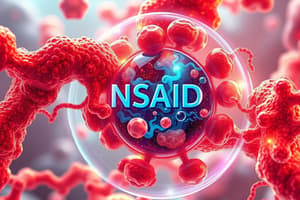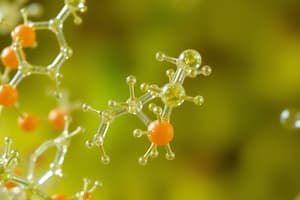Podcast
Questions and Answers
What is a characteristic of allosteric enzymes?
What is a characteristic of allosteric enzymes?
- Have a single binding site for substrate
- Do not undergo structural changes
- Composed of only one protein chain
- Composed of multiple protein chains (correct)
Which statement is true about allosteric enzymes?
Which statement is true about allosteric enzymes?
- Regulatory site can be on the same protein chain as the active site (correct)
- Active and regulatory binding sites are the same
- The quaternary structure is not a characteristic of allosteric enzymes
- Binding of a molecule at the regulatory site does not affect the active site
What occurs when a molecule binds to the regulatory site of an allosteric enzyme?
What occurs when a molecule binds to the regulatory site of an allosteric enzyme?
- Changes in the overall 3D structure of the enzyme including at the active site (correct)
- No changes in the enzyme's structure
- Only changes in the substrate binding site
- Changes in the enzyme's primary structure
In feedback control, what controls the activation or inhibition of the first reaction in a sequence?
In feedback control, what controls the activation or inhibition of the first reaction in a sequence?
Which of the following is a mechanism used to regulate enzymes?
Which of the following is a mechanism used to regulate enzymes?
What happens to an enzyme's activity when subjected to extreme temperatures?
What happens to an enzyme's activity when subjected to extreme temperatures?
How does substrate concentration affect enzyme activity?
How does substrate concentration affect enzyme activity?
Competitive inhibition of enzymes involves:
Competitive inhibition of enzymes involves:
Non-competitive inhibition of enzymes involves:
Non-competitive inhibition of enzymes involves:
Uncompetitive inhibition of enzymes involves:
Uncompetitive inhibition of enzymes involves:
Flashcards are hidden until you start studying
Study Notes
Enzyme Inhibition
- Reversible Noncompetitive Inhibition: a molecule decreases enzyme activity by binding to a site on an enzyme other than the active site.
- Irreversible Inhibition: a molecule inactivates an enzyme by forming a strong covalent bond to an amino acid side-chain group at the enzyme's active site, permanently deactivating the enzyme.
Types of Inhibitors
- Inhibitors that decrease enzyme activity by binding to a site on the enzyme other than the active site are associated with Reversible Noncompetitive Inhibition.
- Inhibitors that inactivate enzymes by forming a strong covalent bond at the enzyme active site are associated with Irreversible Inhibition.
- Inhibitors that have a shape and charge distribution similar to that of the enzyme's normal substrate are associated with Reversible Competitive Inhibition.
- Inhibitors whose effect can be reduced by increasing the concentration of normal substrate present are associated with Reversible Competitive Inhibition.
Regulation of Enzymes
- Regulation of enzyme activity is important because a cell that continually produces large amounts of an enzyme for which substrate concentration is always very low is wasting energy.
- The production of the enzyme needs to be "turned off" when the product of an enzyme-catalyzed reaction is present in plentiful amounts in a cell.
- Enzyme concentration affects reaction rate, with a higher enzyme concentration resulting in a greater reaction rate.
Factors that Influence Enzyme Activity
- Increasing the substrate concentration increases the rate of a reaction.
- Increasing the enzyme concentration increases the rate of a reaction.
- Increasing the temperature from its optimum value to a value 10°C higher than this value decreases the rate of a reaction.
- Lowering the pH from the optimum value of 5.0 to a value of 3.0 decreases the rate of a reaction.
Allosteric Enzymes
- Allosteric enzymes are responsible for regulating many cellular processes.
- They have a quaternary structure, consisting of two or more protein chains.
- They have two kinds of binding sites: those for substrate and those for regulators.
- Active and regulatory binding sites are distinct from each other in both location and shape.
- Binding of a molecule at the regulatory site causes changes in the overall 3D structure of the enzyme, including structural changes at the active site.
Mechanisms of Regulating Enzymes
- Feedback Control: a process in which activation or inhibition of the first reaction in a reaction sequence is controlled by a product of the reaction sequence.
Studying That Suits You
Use AI to generate personalized quizzes and flashcards to suit your learning preferences.




